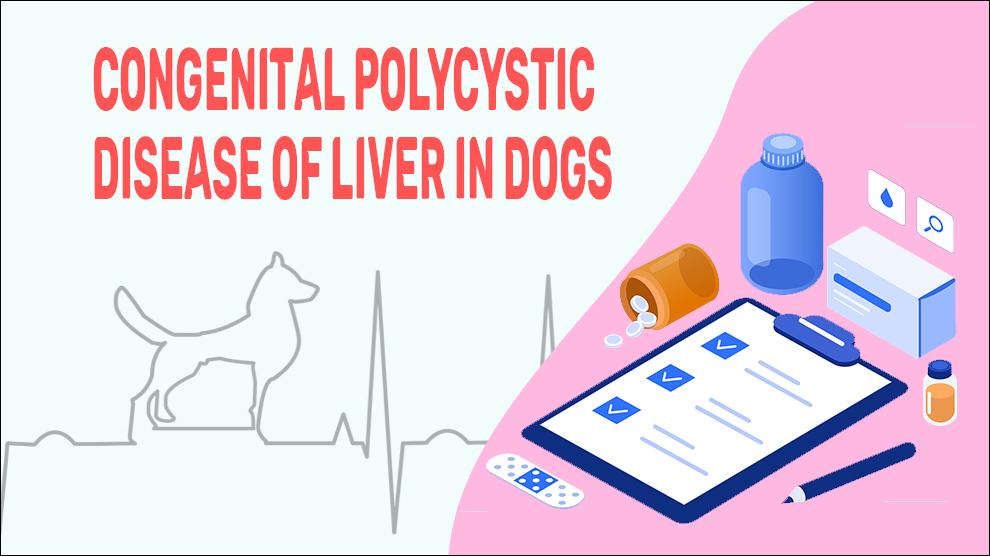Congenital Polycystic Disease of Liver (PLD or PCLD) is a congenital, autosomal dominant, benign, fluid-filled, or solid mass of cells in the liver in dogs. Usually, they are asymptomatic - cause no signs or symptoms and in most cases, it is found only incidentally in imaging studies.
However, occasionally they may be large enough to hamper the function of the liver or interfere with bile flow or they can also be a part of underlying liver diseases.
Typically liver cysts are small, occasionally some may become large enough to cause pain, distension, or discomfort, then drainage or removal of the cysts may be required.
These may be part of underlying conditions such as liver diseases or even liver injuries. Rarely, some cysts may be malignant and these cysts are called cystadenocarcinoma or simply, cystadenoma.
Symptoms Of Congenital Polycystic Disease Of Liver
Treatment Options For Congenital Polycystic Disease Of Liver
Treatment is not necessary for most the PLD. Sometimes, cysts get large and cause discomfort or other symptoms, and then they will be drained or surgically removed.
Fenestration: This is a minimally invasive procedure quite similar to removing the top of a large blister. Using a laparoscopic (keyhole) approach, the surgeon removes the thin lining on the outside of the cyst and this will make the contents of the cyst drain. The left-behind cyst is then cauterized.
Home Remedies For Congenital Polycystic Disease Of Liver
Follow the instructions given to you by your veterinarian for the entire recommended time period. No matter how badly you want relief for your dogs or what you hear from other dog owners, talk with your vet before trying any home remedy.
Make sure to provide plenty of drinking water.
If any specific diet has been suggested to your dog, follow the diet very strictly, and never provide or allow others to give your dog treats or other food.
Prevention Of Congenital Polycystic Disease Of Liver
The only way to prevent congenital polycystic disease is to evaluate the affected dogs before breeding or at least before getting a dog from a susceptible lineage and get the health checks done.
Don’t skip monthly vet visits and check for other metabolic diseases.
Keep prescription and OTC drugs, like ibuprofen out of reach of dogs.
Affected Breeds Of Congenital Polycystic Disease Of Liver
Cairn Terrier, Bull Terrier, Beagle, West Highland White Terrier, Bedlington Terrier, Cocker Spaniel, Chihuahua, Doberman Pinscher, Maltese, Labrador Retriever, Standard Poodle, Skye Terrier, Springer Spaniel.
Additional Facts For Congenital Polycystic Disease Of Liver
- Causes:
It is still unclear what triggers liver cysts.
- Types:
Cysts may be congenital or acquired.
- Congenital Cysts: This is a hereditary anomaly in the liver and affected dogs are born with the cysts.
- Acquired Cysts: This is a result of infections, trauma, and exposure to toxins, and harmful chemicals.
- Morbidity:
Liver cysts are usually benign, which means they are non-cancerous. Occasionally, liver cysts can grow or multiply large enough to affect liver function. Very rarely, these cysts can become malignant and can metastasize beyond the liver.
- Mortality:
There is no documented mortality due to this condition.
- Diagnosis:
- Ultrasound
- MRI
- CT scan
- Blood tests to determine parasitic infection.
- Prognosis:
The prognosis for the congenital polycystic disease is really good. As the existing condition is not life-threatening, no rigorous treatment is usually necessary. However, relapse is possible following medical treatment in affected dogs. Proper hygiene and home care are the best defenses against future recurrences.
When To See A Vet
It’s better to set up an appointment with your veterinarian if you notice:
- Protruding or distended stomach.
- Continuous pain in the upper-right part of the stomach.
Food Suggestions For Congenital Polycystic Disease Of Liver
- Add lots of veggies (green leafy vegetables, broccoli, carrots, especially).
- Protein: Lean chicken or turkey breast, lean beef, and Cooked fish (salmon, tuna).
- Vitamin C foods: Strawberries, Citrus fruits, Potatoes, Tomatoes.
- Antioxidants: Blueberries, Cauliflower, Beets, Beans, etc.
- Flavonoids: Blueberries, Blackberries, Cranberries, Eggplant, etc.
- Beta carotene foods: Orange, yellow, and green leafy vegetables and fruits(such as tomatoes, carrots, spinach, lettuce, sweet potatoes, cantaloupe, broccoli, etc ).
Foods to avoid:
- Avoid dairy products.
- No fried, ultra-processed, Hard, or jagged foods (such as Crunchy crackers, chips, etc).
- Hard to digest grains and greasy foods.
- White bread, Rice, and Pasta.
- Aerated/fizzy drinks, fruit juices, and Fatty/Fast Food Items.
Conclusion
As most PLD for affected dogs is incidental and benign, they do not require treatment or monitoring over time. The Prognosis is also excellent. Some cysts are large and hamper liver function or block the bile flow, they are warranted for long-term monitoring every 3-6 months.

















